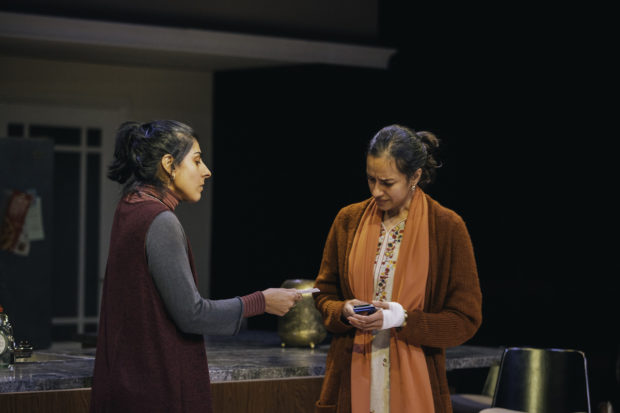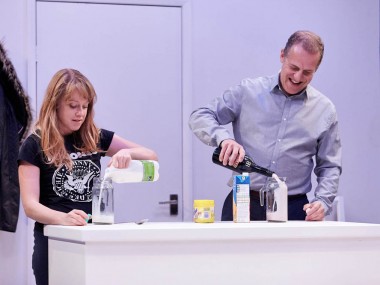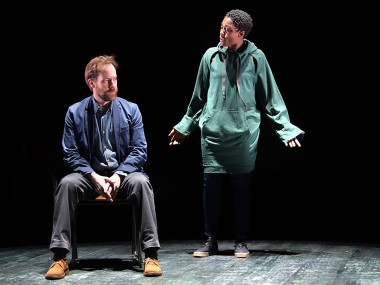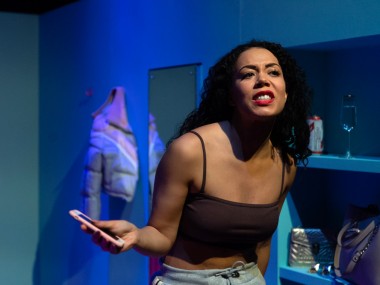Expendable, Royal Court
Wednesday 27th November 2024

British theatre excels in presenting social issues: at its best, it shines a dazzling light on the controversial subjects that people are thinking, and talking, about. Emteaz Hussain’s excellent new play, in the Royal Court’s upstairs studio, is based on the appalling crimes, which took place from the 1990s to the 2010s and involved hundreds of young girls being sexually exploited in northern towns by gangs of predatory men. Broadly based on the Rotherham child sex abuse scandal, which affected some 1,400 girls who were groomed by gangs of mainly Asian men, Expendable has little to say about the young girls, but instead explores the wider ramifications of the case as it affects two British Pakistani women.
Set in the fictional deindustrialized town of Forestdale, somewhere near Manchester, the play focuses on two sisters, Zara and Yasmin Sharif. It’s November 2011, and the scandal has become public. Zara is involved because, some years ago, one of the accused, a decorator called Sajid, did work on her kitchen, where he met and groomed Jade, a white teen neighbour. Added to this, her own daughter Sofia, now 18, was also at risk, while her 20-year-old son Raheel has just been falsely named as one of the abusers. And there is widespread hostility against him in the town. When Yasmin, Zara’s older sister, visits from Manchester, for the first time in two years, the emotional temperature rises.
One reason for this lies in the contrasting characters of the two women: while Zara is a practising Muslim who works in a local community centre, with her children Sofia and Raheel being similarly strict, Yasmin is the opposite. She’s a social worker who swears, drinks and has married a Rastafarian, a scandal which resulted in her moving to Manchester to avoid community censure. She is also acutely conscious that her 21-year-old son Jamal, who was once Raheel’s best mate, would not be accepted by strict Pakistani Muslims because of his sexuality. For her, the paedophile scandal is all about toxic masculinity — she’s sick of women being “expendable”.
With enormous skill, Hussain outlines not only the sibling tensions between Zara and Yasmin, but also the social context of community life. In this world, community leaders are religious men, often connected to the mosque, who support young people with jobs and get elected to the council. As the sex abuse scandal becomes public, repercussions spread: racist thugs are demonstrating in the town, police are arresting Asian youth, and an old man has been beaten to death by a white gang. This febrile atmosphere means that Sofia, encouraged by a Muslim New Dawn group, wants to protest, while Raheel needs to keep his head down.
Hussain’s text emphasizes Zara’s sense of guilt at her inadvertent role in facilitating Sajid’s grooming of Jade, who is now a young mother and, in the wake of the scandal, keen to write a book about herself and other victims. When Jade comes knocking on the door, Zara hides. It is central to her development over the course of the drama that she manages to confront her own negative feelings about Jade. After all, the playtext has an epigraph by Toni Morrison which defines adulthood as a place where we can “consciously, deliberately be good”. In Expendable, all the characters grow towards that realization.
Hussain bravely explores the tensions within Muslim communities between tradition and more progressive thinking. Yasmin in particular is vocal in her criticism of the men: as she powerfully points out, in the mosque the men get the best large toilets, the women the small one; the men arrive at the front of the building, the women through the side door. So while she agrees that the media has demonized Muslim men over the sex abuse scandal, she also exposes the problems with traditional masculinity and its vile prejudices. Similarly vivid as a character is Sofia, who wants to become a community activist instead of going to uni, and whose Twitter handle is @the.purple.hijab.
Expendable has a lot of material about the specifics of British Pakistani culture, and it attacks the shortcomings not only of the media, but also of the police and politicians. And although details of the sex abuse are mercifully brief, there is one case which is harrowing to listen to. Apart from that there are some provocative and disturbing ideas, such as the notion that abusers groom not only children, but adults as well: they wheedle their way into families and communities. At the same time, there is some welcome comedy in the interaction between Zara and Yasmin, and a couple of musical moments that raise the spirits, By the end of the show, a real sense of hope is established and you feel as if you have gone on a journey of discovery along with the characters.
Okay, the play is not perfect. Although it’s great to put British Pakistani women centre stage, the absence of the older generation of men — husbands, uncles, whatever — means that a potentially full-length play has been shrunk into 90 minutes. And, towards the end of that running time, things begin to flag a bit. When a character says , “We can’t part like this”, you just know that something’s not quite right. Still, there’s a lot to enjoy in director Esther Richardson’s fast-moving production, which takes place in designer Natasha Jenkins’s finely detailed open-plan kitchen set (a place which holds its own negative vibes for Zara and her family, while also being used for daily domesticity such as onion chopping, tea-making and pizza-baking).
And the acting is uniformly good: Avita Jay’s troubled and asthmatic Zara contrasts well with Lena Kaur’s more worldly and passionate Yasmin, while Gurjeet Singh’s cautious but warmhearted Raheel provides a similar foil to his sister, Humera Syed’s energetic and activist Sofia. As the outsider to this family, Maya Bartley O’Dea’s Jade makes the most of a comparatively small part. With its firm criticism of fundamentalist ideas, its disgust with hypocrisy, antagonism to the far right, skepticism to outsider interventions, and its emotional commitment to change, this is a superbly intense mix of the personal and political. Excellent new writing.
This review first appeared on The Arts Desk




